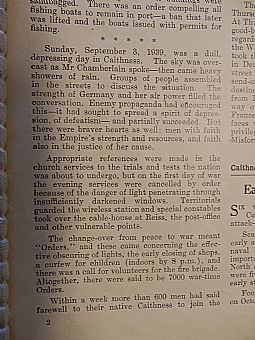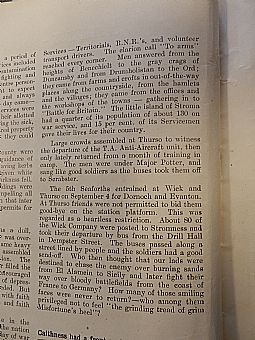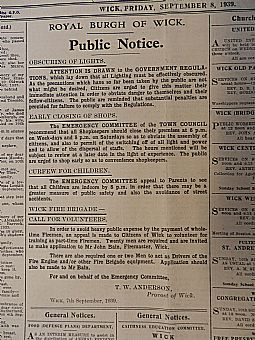Week 1: 4-10 September 1939
On Monday 4 September the RAF launched a raid on the German fleet in the Heligoland Bight, but failed to inflict significant damage. The naval blockade of Germany began. On Wednesday 6 September German forces captured Krakow in Poland. Thursday 7th saw French forces moving into German territory in the Rhine valley. The week ended with the French offensive stalling after an advance of just a few miles on Saturday 9 September.
In Caithness, preparations for war continued. Hetty Munro of Thurso noted that “of course even before the actual war our small town was full of sailors and soldiers passing through to Scapa … One day I was out [for] a short walk and met someone whose husband had just gone to France. That, although I hardly knew her or her husband, I think brought home to me more than anything the fact that again we were at war with Germany”.

 N.G. Glass recalled: “Large crowds assembled at Thurso to witness the departure of the T.A. Anti-Aircraft unit, then only lately returned from a month of training in camp. The men were under Major Potter, and sang like good soldiers as the buses took them off to Scrabster.”
N.G. Glass recalled: “Large crowds assembled at Thurso to witness the departure of the T.A. Anti-Aircraft unit, then only lately returned from a month of training in camp. The men were under Major Potter, and sang like good soldiers as the buses took them off to Scrabster.”
“The 5th Seaforths entrained at Wick and Thurso on September 4 for Dornoch and Evanton. At Thurso friends were not permitted to bid them good-bye on the station platform. This was regarded as a heartless restriction. About 80 of Wick Company were posted to Stromness and took their departure by bus from the Drill Hall in Dempster Street. The buses passed along a street lined with people and the soldiers had a good send-off.”
 No one knew what to expect with the outbreak of war, and there was widespread fear that Britain would see aerial bombing by German planes, such as was already being visited upon Polish cities. Schools in the county were closed, Forss School recording that, “Owing to the outbreak of war in Europe the school has been closed for one week”.
No one knew what to expect with the outbreak of war, and there was widespread fear that Britain would see aerial bombing by German planes, such as was already being visited upon Polish cities. Schools in the county were closed, Forss School recording that, “Owing to the outbreak of war in Europe the school has been closed for one week”.
Only Stemster School was open on the Monday "as there was no direct word from the Clerk to the contrary. All other schools, I understand, were closed today." The school was open on Tuesday morning as well, "but instructions to hand a little ago from the Clerk have obliged us to close. Gas masks were issued yesterday to adults and to children over 12, but none were available for Juniors and infants."
The John O’Groat Journal for Friday 8 September carried a four-point public notice for the Royal Burgh of Wick on behalf of the Emergency Committee. Members of the public were reminded that “all Lighting must be effectively obscured”, adding “As the precautions which have so far been taken by the public are not what might be desired, Citizens are urged to give this matter their immediate attention”.
 Shopkeepers were advised to close their premises at 6 p.m. on weekdays and 8 p.m. on Saturdays “to obviate the assembly of citizens”, and a curfew for children was introduced, with parents asked to “see that all Children are indoors by 8 p.m.”. Finally, there was an appeal for twenty volunteer firemen, “in order to avoid the heavy public expense by whole-time Firemen”.
Shopkeepers were advised to close their premises at 6 p.m. on weekdays and 8 p.m. on Saturdays “to obviate the assembly of citizens”, and a curfew for children was introduced, with parents asked to “see that all Children are indoors by 8 p.m.”. Finally, there was an appeal for twenty volunteer firemen, “in order to avoid the heavy public expense by whole-time Firemen”.
Meanwhile, the Wick Harbour Trust noted that harbour traffic would be “seriously affected during the continuance of the war”, with a likely impact on finance.
Coming soon! Week 2,11th - 17th September 1939, will be published on Monday 10th September 2012. To view previous issues please use the menus on the right hand side of the page.
Comments
Thanks for the good wishes. Hope you continue to find it interesting over the weeks and months...
Gordon
From time to time we had practice drills were Miss slater had us diving under our desks and putting on our masks but we never ever thought at that time that we would do it for real. I do remember that one day someone said they had felt a strange smell and a rumour grew that there was a gas attack and we were sent home but it turned out to be a bad drain at Nipster. Rumours spread around fast even without telephones etc and were added to - there were always rumours of spies if I remember correctly.
As far as we were concerned I think we carried gas masks to school until say 1942 when the requirement was abolished and were we glad as having to carry the blessed thing 2 miles to school and back as well as your piece and books was quite a burden for a six year old.
Gas masks would have been useless in the face of a gas attack and I wonder how much they cost to manufacture etc but it showed the populace that HMG was doing something





